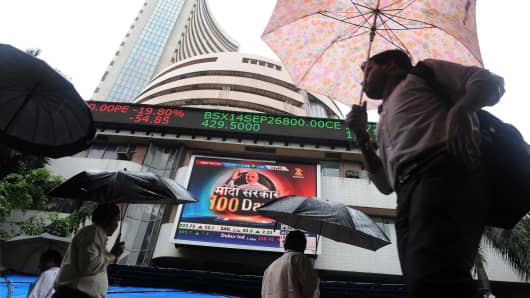Why India markets will continue to break records
Nov 28, 2014

India markets have made a stunning recovery from last year's taper tantrum, with the Nifty index at record highs, and some analysts are calling the run up just the beginning.
"India has huge growth potential and it is a structural story. If you are not in it, buy it," said Bhaskar Laxminarayan, chief investment officer at Swiss private bank Pictet, which has made the market a core holding in its Asian portfolios.
Indian assets have already seen a strong rally. Both the Nifty and Sensex indexes are tapping record highs after rising around 37 percent each so far this year. Last year during the taper tantrum, the rupee tumbled to a record low, with the U.S. dollar fetching nearly 70 rupees. This year, the currency has remained in a tighter range, with the dollar fetching around 58-63 rupees.
Laxminarayan believes India is on a structural upswing, offering a five to 10 year opportunity.
"The one key thing in India that is changing and changing for the better is inflation," which has been primarily driven by food and energy prices, Laxminarayan said.
The decline in oil prices has been a "gift," he said, adding "food is being addressed very aggressively both in terms of how food is being sourced, how it's being stored and how it's being distributed."
Around 40 percent of India's fresh produce spoils before reaching markets, according to estimates from the U.N.'s Food and Agriculture Organization, while around 21 million metric tons of wheat – equal to around all of Australia's production – is wasted each year due to inadequate storage and distribution, according to a government study.
Improving this inflation picture means that India's interest rates – currently set at 8 percent by the Reserve Bank of India – can come down, Laxminarayan said, offering the next catalyst for growth.
The opportunity may be in bonds as well as stocks.
"We are investing into India as a non-benchmark exposure," said Cecilia Chan, chief investment officer for fixed income in Asia at HSBC. She cited positives from the recent election results, with reform-minded Prime Minister Narenda Modi taking power and his party garnering solid support in state-level elections last month.
While past volatility in the rupee has deterred foreign investors from investing in the country's bonds, "we think it will not be as volatile as before [and] that it will gradually appreciate or stabilize," Chan said, adding HSBC views the currency as undervalued. She expects "good yield carry" from India's bond market, especially as the rupee tends to be less correlated with the U.S. dollar, which is widely expected to continue appreciating.
To be sure, some believe the market rally might be getting a bit long in the tooth.
"Indian equities appear to be at a particularly stretched point," Credit Suisse said in a note Monday, citing the market's "over-exposure" in emerging market funds as well as the sharp gains.
Indian shares are trading at around 16.9 times 12-month forward earnings, compared with a five-year average of 14.5 times, according to Credit Suisse data.
"We believe it is prudent at this juncture to book some profits," it said, but it's sticking with an overweight call, just trimming it to 10 percent above the benchmark, from 15 percent previously.
"The longer-term case for structural outperformance remains intact," it said, citing improving inflation and policy-rate expectations, structural reforms and the market's insulation from concerns over China's growth and yen weakness.
Others think the gains are just too soon.
"Modi's reforms are expected to help India play catch-up with other emerging markets and advance economic development," said Wells Fargo Private Bank in a note Wednesday. "However, we believe it will take considerable time and effort to remove the deeply entrenched political obstacles," including corruption and onerous bureaucracy. It's sticking with a neutral view on the market.
Source: CNBC